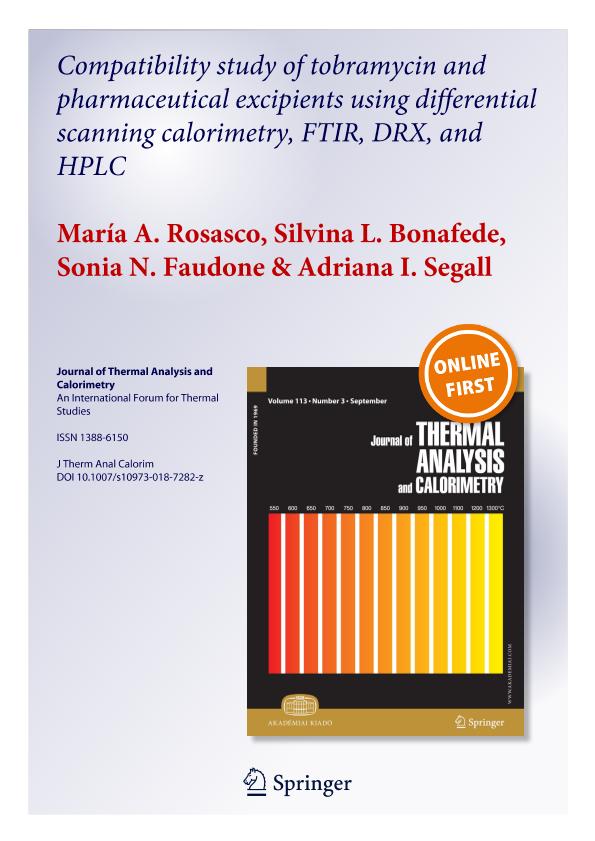Mostrar el registro sencillo del ítem
dc.contributor.author
Rosasco, María Ana

dc.contributor.author
Bonafede, Silvina Laura

dc.contributor.author
Faudone, Sonia Nerina

dc.contributor.author
Segall, Adriana Ines

dc.date.available
2020-03-05T20:34:37Z
dc.date.issued
2018-12
dc.identifier.citation
Rosasco, María Ana; Bonafede, Silvina Laura; Faudone, Sonia Nerina; Segall, Adriana Ines; Compatibility study of tobramycin and pharmaceutical excipients using differential scanning calorimetry, FTIR, DRX, and HPLC; Springer; Journal of Thermal Analysis and Calorimetry; 134; 3; 12-2018; 1929-1941
dc.identifier.issn
1388-6150
dc.identifier.uri
http://hdl.handle.net/11336/98880
dc.description.abstract
Differential scanning calorimetry (DSC), isothermal stress testing–Fourier transform infrared spectroscopy (IST–FTIR), isothermal stress testing–high-performance liquid chromatography, and powder X-ray diffraction (PDRX) were used as screening techniques for assessing the compatibility of tobramycin with some currently employed ophthalmic excipients. In the first phase of the study, DSC was used as a tool to detect any interaction. The absolute value of the difference between the enthalpy of the pure tobramycin melting peak and that of its melting peak in the different analyzed mixtures was chosen as a parameter of the drug–excipient interaction degree. DSC results demonstrated that benzalkonium chloride, monobasic sodium phosphate, boric acid, edetate disodium, sodium metabisulfite, thimerosal, and potassium sorbate interact with tobramycin. Taking into account these results, it could be suggested that some of the changes observed in the IST–FTIR spectra of binary blends of tobramycin and some of the excipients would account for a possible interaction between the mixture component. In this study, PDRX did not provide much information, since only tobramycin–thimerosal interactions could be detected. DSC and IST–FTIR are suitable and simple methods for the detection of potential incompatibilities between active pharmaceutical ingredient (API) and excipients.
dc.format
application/pdf
dc.language.iso
eng
dc.publisher
Springer

dc.rights
info:eu-repo/semantics/openAccess
dc.rights.uri
https://creativecommons.org/licenses/by-nc-sa/2.5/ar/
dc.subject
COMPATIBILITY STUDIES
dc.subject
DSC
dc.subject
IST–FTIR
dc.subject
IST–HPLC
dc.subject
PDRX
dc.subject
TOBRAMYCIN
dc.subject.classification
Otras Ciencias de la Salud

dc.subject.classification
Ciencias de la Salud

dc.subject.classification
CIENCIAS MÉDICAS Y DE LA SALUD

dc.title
Compatibility study of tobramycin and pharmaceutical excipients using differential scanning calorimetry, FTIR, DRX, and HPLC
dc.type
info:eu-repo/semantics/article
dc.type
info:ar-repo/semantics/artículo
dc.type
info:eu-repo/semantics/publishedVersion
dc.date.updated
2020-03-05T15:00:10Z
dc.journal.volume
134
dc.journal.number
3
dc.journal.pagination
1929-1941
dc.journal.pais
Alemania

dc.journal.ciudad
Berlin
dc.description.fil
Fil: Rosasco, María Ana. Universidad de Buenos Aires. Facultad de Farmacia y Bioquímica. Laboratorio de Control de Calidad de Medicamentos; Argentina
dc.description.fil
Fil: Bonafede, Silvina Laura. Universidad de Buenos Aires. Facultad de Farmacia y Bioquímica. Laboratorio de Control de Calidad de Medicamentos; Argentina
dc.description.fil
Fil: Faudone, Sonia Nerina. Provincia de Córdoba. Ministerio de Ciencia y Técnica. Centro de Excelencia en Productos y Procesos de Córdoba; Argentina
dc.description.fil
Fil: Segall, Adriana Ines. Consejo Nacional de Investigaciones Científicas y Técnicas; Argentina. Universidad de Buenos Aires. Facultad de Farmacia y Bioquímica. Laboratorio de Control de Calidad de Medicamentos; Argentina
dc.journal.title
Journal of Thermal Analysis and Calorimetry

dc.relation.alternativeid
info:eu-repo/semantics/altIdentifier/doi/http://dx.doi.org/10.1007/s10973-018-7282-z
dc.relation.alternativeid
info:eu-repo/semantics/altIdentifier/url/https://link.springer.com/article/10.1007%2Fs10973-018-7282-z
Archivos asociados
